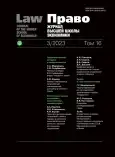Loss of Territory because of Sea Level Rise and Fortune of the State
- Авторлар: Shinkaretskaya G.1
-
Мекемелер:
- Institute of State and Law, Russian Academy of Sciences
- Шығарылым: Том 16, № 3 (2023)
- Беттер: 173-191
- Бөлім: Law in the Modern World
- URL: https://journal-vniispk.ru/2072-8166/article/view/318260
- DOI: https://doi.org/10.17323/2072-8166.2023.3.173.191
- ID: 318260
Дәйексөз келтіру
Толық мәтін
Аннотация
The rise in the level of the world ocean due to global climate warming and the active melting of the glaciers of Antarctica, the Arctic and Greenland has created serious threats to the population (numbering more than a billion) of the low-lying places of the planet, which are threatened with complete flooding of their territories, so that some states located on them may completely cease to exist. At the end of the twentieth century, the Pacific island States, whose height above sea level does not exceed 10 meters, called on the international community to pay attention to the issue. They are taking measures for the construction of protective walls, etc., but most of these countries are developing, and such structures require them to incur exorbitant costs. Four elements that make up the concept of the State are generally recognized. Its population and Government can operate on the territory of other States, but without the territory where the State exercises its sovereign rule, it cannot exist. Still alienating those in a small number of cases, it was committed by the State itself, and for the most part as a result of the commission of an international crime, such as conquest or occupation. There were no examples of the termination of the state as a result of natural phenomena in the world. The institution of responsibility arises in a new way: no one is to blame for catastrophic events; the international community is responsible for ensuring the normal existence of threatened States and their populations. The positions expressed by the States show that the island States themselves and other members of the international communitypresume the continuation of the international legal personality of the submerged States. In the practice of States, there are examples when they have changed the status of part of their territory, sometimes unusual, such as, for example, joint sovereignty. Joining another state, formation of a federation or confederation, cession or lease of territory are more common. There is not a single promising assumption yet. It is clear that the international community will play a decisive role in the fate of the flooded States. The UN International Law Commission and the International Court of Justice are involved in the analysis of a complicated problem.
Авторлар туралы
Galina Shinkaretskaya
Institute of State and Law, Russian Academy of Sciences
Email: noreply@hse.ru
ORCID iD: 0000-0001-7459-1120
Doctor of Sciences (Law), Principal Researcher
Әдебиет тізімі
- Aubert F. (1994) The historical development of confederations. Santorini: Venice Commission, 25 p.
- Chernichenko S.V. (1999) Theory of international law. Vol. II. Moscow: NIMP Press, 525 p. (in Russ.)
- Crawford J. (2006) The creation of states in international law. 2nd ed. Oxford: University Press, 680 p.
- Dictionary of International Law (2014) S.A. Egorov (ed.). Moscow: Statut, 493 p. (in Russ.)
- Filimonova M.V. (2011) Main principles of international law. In: International Public Law. K.A. Bekyashev (ed.), pp. 81-82 (in Russ.)
- Frowein J. (2003) Rocks, new-born islands, sea level rise and maritime space. In: J. Frowein et al. (eds.) Negotiating for peace. Berlin — Heidelberg: Springer, pp. 599, 602.
- Lowe V. (2011) The jurisdiction. In: M. Evans (ed.) International Law. 2nd ed. Oxford: OUP, 335 p.
- Lukashuk I.I. (2000) Territory of state. In: International Law. Moscow: Bek Publishers, 420 p. (in Russ.)
- Maksimenko S.V. (2022) Migration as a form of realizing right for free movement: concept, types and stages. Rossiyskiy ezhegodnik mezhdunarodnogo prava 2021=Russian Annual Review of International Law 2021. Saint Petersburg: Kontrakt Publishers, 317 p. (in Russ.)
- Martyshin O.V. (2018) On forming concept of the state. Vestnik Moskovskogo Universiteta Kutafina=Bulletin of Kutafin University, no. 4, pp. 37-48 (in Russ.)
- Nichols R. et al. (2011) Sea-level rise and its possible impacts given a “beyond 4 C world” in the twenty-first century. Philosophical Transactions of the Royal Society-A, pp. 161-181. DOI:https://doi.org/10.1098/rsta.2010.0291
- Pale S.E. (2022) The Forum of Pacific Ocean in the big play of world powers. Yugo-Vostochnaya Aziya: aktual'nye problemy razvitiya=South Eastern Asia: Issues of Development, vol. 4, no. 4, pp. 72-83 (in Russ.)
- Santolaria J. (2016) Vatican and the Holy See. In: A. Carty (ed.). Oxford Bibliographies in International Law. New York: Oxford University Press, 35 p.
- Vidas D., Freestone D., McAdam J. (2019) International law and sea level rise: a report of the International Law Association Committee on international law and sea level rise. Leiden: Brill, 35 p. DOI:https://doi.org/10.1163/9789004398191
- Warbrick C. (2010) States and recognition in international law. In: M. Evans (ed.). International Law. Oxford: OUP, pp. 315-347.
Қосымша файлдар








